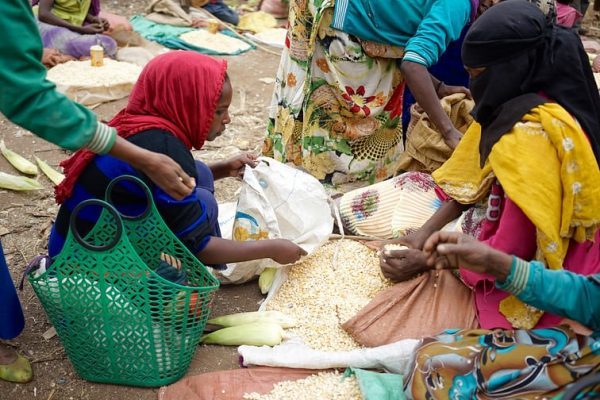
A woman sells maize at the market in Sidameika Tura, Arsi Negele, Ethiopia. (Photo: Peter Lowe/CIMMYT)
By: Innocent Mhangarai
The majority of households and business people have made resolutions for the year 2021, this calls for close attention as there is need to dwell more on questions that open doors, unearth answers and trigger positive change among producers, traders in rural economies and other value chain actors in developing countries. In quest for tools and systems to advance practices, we should not overlook the fact that questions are the most authoritative armaments in breaking down barricades, realizing unseen paradoxes, cracking riddles and picturing new ways of doing things in the new normal enchanted by the corona virus pandemic.
The COVID-19 pandemic has persuaded lock downs that have exposed the notch to which formal and informal economies in Africa do not work in seclusion but are more like doppelgangers. New corona virus cases continue to threaten lives across the globe as authorities lock down countries to prevent community level transmissions with dire consequences for local and national economies. Various group structures within the society have been affected differently by the virus and currently governments are focusing more on strengthening their systems to be better able to deal with the virus while reducing new infections and recovery mechanisms for those already affected. Therefore, the majority of African economies are designed in a manner that if one chain of supply is locked down is affects the entire value chain.
Below is a sample of questions that households and institutions should try to answer in 2021:
- How do small to medium enterprises and farmers in rural ecologies crack obstacles into strong points?
- How can value chain actors stay stupendously positive in difficult times like in the midst of the COVID-19 pandemic?
- Why should we divulge the cost of bad statistics to policy makers and different value chain actors?
- Meanwhile marginal societies in developing countries do not have information fountains, is it conceivable that knowledge is stored in their genes? Will that prevailing data be able to reach the oncoming generations?
- How can ordinary people be supported in order to tell their captivating stories?
- How do we use informal markets to inspire consumption behaviours and buying patterns?
- To what extent are structured value chains the only idyllic method of organizing African ways of conducting business? For many years there is a strong assumption that for one to succeed in their business, they must be doing contract-based production. Is it rhetoric or reality?
Advancing beyond business obstructions in 2021
There is no hesitation that many general dealers and traders in diverse rural economies experienced recurrent distresses in different value chains due to market catastrophe as a result of lock downs and curfews amongst other factors. Nevertheless, questioning and finding answers for the right queries may empower them to move outside obstructions in 2021. The accurate inquiries are not only an expression of inquisitiveness which buttresses connection, fostering self-effacement and inspiring peers. They crack admittance to large puddles of facts and dispositions that can apprise decision making and advance day-to-day happenings towards
advanced progress in 2021 and the coming years.







